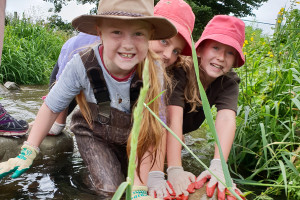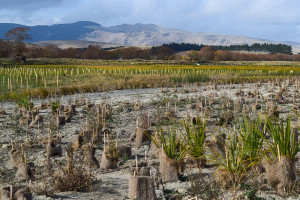Selwyn Waihora Water Zone Committee Action Plan 2021-2024
Each of Waitaha/Canterbury’s water zone committees has an action plan which outlines how they will work with the community to deliver their aspirations for freshwater as outlined in the Canterbury Water Management Strategy (CWMS).
The CWMS puts the future of our water resources in the hands of the community. Zone committees work collaboratively to develop recommendations for councils and other organisations to deliver shared goals and targets.
Committee purpose
To uphold the mana of the freshwater bodies within Selwyn Waihora by facilitating enduring land and water management solutions that give effect to the Canterbury Water Management Strategy (CWMS) vision, principles and targets in our zone.
The CWMS aims to enable present and future generations to gain the greatest social, economic, recreational and cultural benefits from our water resources within an environmentally sustainable framework.
Committee role
- To get involved in an active programme of community engagement on freshwater management matters.
- To facilitate relevant advice to councils and other organisations contributing to freshwater management.
- To extend the resources available to implement the CWMS by working with stakeholders across all sectors and seeking opportunities to promote, support, leverage and expand catchment-based initiatives that deliver the CWMS.
- To report back annually to councils and Rūnanga on progress towards delivery of the zone-specific priorities.

Snake Creek

Ahuriri Lagoon near Te Waihora/Lake Ellesmere
Our actions
Find out more about how we're tracking to achieve our goals and what progress has been made in the last year.
View the 2021/22 progress report.
We will help raise awareness about the risks to private drinking water supplies by:
- Requesting and assisting with consolidation of information to raise awareness about the safety of private drinking water supplies by July 2021.
- Attending or hosting at least one public event each year to raise awareness about water quality in private drinking water supplies and wider water quality trends.
- Investigating opportunities for accessible community testing by late 2021.
We will enhance mahinga kai, biodiversity and recreation opportunities by:
- Support (e.g. host or fund) at least one public information session on mahinga kai each year.
- Developing ‘prompt questions’ to ensure mahinga kai is built into decision making and projects by December 2022.
- Using at least one method each year to support rūnanga and agencies to implement mahinga kai projects.
- Hosting at least one biodiversity-focused celebration each year.
- Publicising and celebrating measurable improved biodiversity outcomes for at least one project each year.
- Publicising and supporting at least two planting days per year.
- Co-hosting a 2023/24 Rakaia field trip with Ashburton Water Zone Committee, with a focus on biodiversity and recreation.
- Requesting Environment Canterbury and Department of Conservation briefings on progress in the identification of fish passage issues, improved guidelines, and Environment Canterbury’s prioritised approach to improving intake design of fish screens.
We will facilitate actions to achieve catchment nutrient targets and water quality outcomes by:
- Requesting at least two verbal or written updates each year on progress - including current rules, consent updates, audit results, meeting the PC1 modelled nitrogen load.
- Attending at least three Environment Canterbury farm advisory drop-ins per year.
- Supporting or attending an urban event to share knowledge and encourage behaviour change that will improve urban stormwater quality.
- Supporting (e.g. hosting, funding), or promoting a rural community event that educates and shares solutions to meeting and/or reducing nutrient limits in the zone.
We will support actions to restore Te Waihora to a healthy state by:
- Attending and contributing to Te Waihora Co-Governance and Whakakōhanga Kōrero Group meetings.
- Work alongside Co-Governance to advocate for and contribute to a map of all projects in the catchment.
- Assisting Te Waihora Co-Governance with community engagement and communications.
- Requesting and completing regular reporting to/engagement with Te Waihora Co-Governors.
- Investigating the impact of 4WD use and rubbish dumping, and options for low-impact recreational use in Te Waihora catchment rivers.
We will facilitate a community-wide approach to restore the Waikirikiri/Selwyn River back to a healthy state by:
Seeking support in the form of a partnership and actively seeking resources and practical projects, including:
- Identifying and requesting specific priorities/actions/locations/funding for councils and agencies to prioritise by June 2022.
- Writing at least one story for publication on the Waikirikiri each year.
- Attending and contributing to relevant community/partner meetings.
- Investigating options for community river monitoring such as a “scorecard” that supports a healthy Waikirikiri/Selwyn river.
- Promoting and enabling school engagement and citizen science.
Ensuring all practical work is based on best practice and evaluation, including:
- Actively pursuing research into the effectiveness of riparian planting to ensure best practice and positive environmental outcomes.
- Requesting regular reporting on water quality in Silverstream catchment, and providing this information to the community.
- Recommending summer student internships to relevant councils for specific research.
- Requesting regular Waikirikiri/Selwyn-related project updates and contributing ideas and support to ensure projects progress.
- Supporting Greendale School’s Enviroschools work in the Near River Recharge project and supporting the NRR and Targeted Stream Augmentation projects.
Support landowner work in the catchment:
- Supporting the Environment Canterbury zone team to encourage catchment groups and implement the Swimmable Selwyn at Coes Ford project.
- Supporting funding bids and land purchases.
Council priorities
Zone committees are joint committees of local and regional councils, with mana whenua and community representation. Councils provide CWMS priorities for each zone committee to guide the committee’s action plans.
Selwyn District Council priorities
- Align all zone activities with the overall social, economic, environmental and cultural wellbeing for the district.
Christchurch City Council (CCC) priorities
Public awareness and engagement
- Model manaakitanga (caring and respect) for our waters and promote takohanga (commitment) and kaitiakitanga (stewardship) through:
- Leading water forums and supporting CCC initiatives to give effect to Te Mana o Te Wai;
- Advocacy of and support for the Community Water Partnership, connections with members’ community and professional networks;
- Supporting erosion and sediment control workshops for industry.
Environment Canterbury priorities
Kaitiakitanga Wāhi Taonga and mahinga kai targets
- Grow support and resources to achieve the goal of five mahinga kai projects.
Ecosystem health and biodiversity targets
- Increased riparian management to protect aquatic ecosystems.
- Reducing the number of fish barriers.
- Protection and enhancement of wetlands.
Recreation and amenity targets
- Achieving the 2025 target to restore priority freshwater recreation opportunities in each zone.
